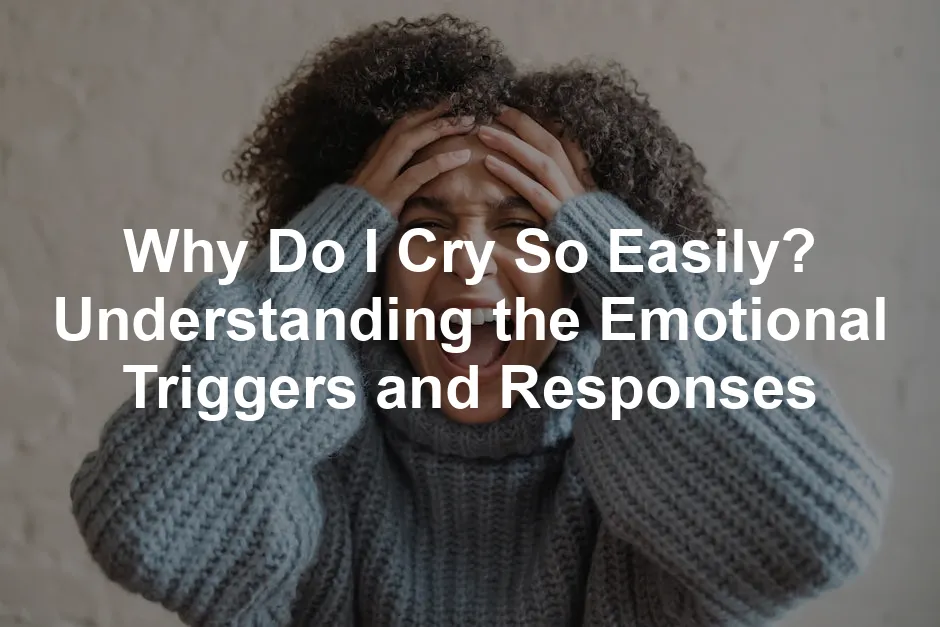
Why Do I Cry So Easily? Understanding the Emotional Triggers and Responses
Introduction
Crying is a powerful emotional response. It helps us process feelings and experiences. Many people find themselves crying more often than they expect. This article explores why some individuals tear up easily, looking at emotional, psychological, and physical factors that contribute to this response.
Understanding emotional responses is crucial for mental health, as it allows individuals to process their feelings more effectively. why understanding emotional responses is crucial for mental health
Summary and Overview
Crying is a common and natural reaction to various emotions. It serves as a release valve for pent-up feelings. Factors influencing crying include emotional sensitivity, hormonal fluctuations, and mental health challenges. Understanding why you cry easily can lead to greater self-acceptance and improved mental health. Recognizing these triggers allows you to embrace your emotional responses and seek support when needed. After all, crying can be a healthy part of processing emotions and connecting with others.
To help navigate these emotional waters, consider investing in a self-help book. These gems can provide insights and tools to help you understand and manage your emotions more effectively.

Understanding Crying
What Happens When We Cry?
Crying is a fascinating physiological process. It involves your tear glands producing tears. There are three types of tears: basal, reflexive, and emotional. Basal tears keep your eyes moist. Reflexive tears occur when something irritates your eyes, like smoke or onions. Emotional tears, however, are what we often think of when we associate crying with feelings.
When you cry emotionally, your brain releases stress hormones. This act can help you process feelings and release built-up tension. Crying acts as a natural stress relief mechanism, promoting emotional regulation. It’s a way for our bodies to cope with overwhelming situations. So, next time you find yourself crying, remember it’s not just about feeling sad; it serves a significant purpose in maintaining emotional balance.
If you’re looking for a little extra comfort during those emotional moments, a cozy weighted blanket can provide that soothing hug you need. Wrap yourself up, and let the tears flow—it’s all part of being human!

Reasons for Crying Easily
1. High Sensitivity
Some individuals are classified as highly sensitive people (HSPs). This means they experience emotions more intensely than others. HSPs often process their environments deeply. As a result, they may cry more frequently and intensely. This heightened emotional awareness can make everyday experiences feel overwhelming.
For HSPs, even minor events can trigger tears. A sad movie scene or a friend’s struggle may evoke strong emotional responses. Understanding this trait can help HSPs embrace their sensitivity. It’s essential to recognize that crying often serves as a natural outlet for these intense feelings.
If you’re an HSP, you might want to enhance your sensory experiences with a aromatherapy diffuser. The calming scents can provide a soothing backdrop, helping you feel more grounded during emotionally intense moments.

2. Empathy and Emotional Absorption
Empathetic individuals often feel deeply for others. This strong connection can lead to tears when witnessing someone else’s pain or joy. Research shows that empathetic people have heightened emotional responses. Studies indicate that their brains exhibit increased activity when they observe others in distress.
When you feel someone else’s emotions, it can be overwhelming. This shared emotional experience can often lead to tears, even if you’re not directly affected. Recognizing this empathetic trait can help you understand your emotional responses better. It’s okay to cry—it reflects your capacity to connect and care for those around you.
To nurture your empathetic side, consider using a journal. Writing about your feelings and experiences can help process those intense emotions and provide clarity.

3. Hormonal Fluctuations
Hormonal changes can significantly impact your emotional stability. Many individuals experience heightened emotions during PMS, pregnancy, or menopause. These fluctuations can lead to increased crying. For instance, about 75% of women report emotional symptoms during PMS, including crying spells.
During pregnancy, hormonal shifts can intensify emotional responses. Some new mothers experience postpartum depression, characterized by persistent sadness and tears. Menopause also brings hormonal changes that affect mood. Understanding these patterns can help you navigate your emotions better. Recognizing that hormonal changes play a role in your crying can promote self-acceptance and empathy towards yourself.

4. Mental Health Factors
Mental health conditions like depression and anxiety often correlate with increased crying. Depression can lead to overwhelming sadness, making tears more frequent. Symptoms may include persistent low mood, fatigue, and irritability. Anxiety, on the other hand, can heighten emotional responses, leading to crying during stressful moments.
Many individuals with anxiety experience feelings of dread and tension. These feelings can culminate in emotional outbursts, including tears. Recognizing these mental health factors is crucial. If you find that your emotions feel unmanageable, seeking professional help can provide valuable support and coping strategies.
For those dealing with anxiety, a stress relief product may be just what you need to help you cope with those heavy emotions.

5. Stress and Exhaustion
Chronic stress and fatigue can lower your emotional resilience. When you’re constantly overwhelmed, even small challenges might trigger tears. A national survey revealed that millennials report high stress levels, with women often feeling more strain. This stress can create a cycle where emotional responses become heightened.
Lack of sleep contributes to emotional instability, making you more prone to crying. Prioritizing self-care is essential to managing stress. Engage in relaxing activities or practice mindfulness to help reduce emotional overload. Understanding the connection between stress, exhaustion, and crying can empower you to take steps towards emotional well-being.

Consider enhancing your self-care routine with a self-care product. This could be anything from skincare to relaxation tools, helping you recharge and manage stress effectively.
6. Cultural and Familial Influences
Crying is often shaped by our upbringing and cultural norms. In some families, expressing emotions, including tears, is seen as a sign of weakness. This can lead to individuals suppressing their feelings, making it harder to express emotions openly. Conversely, in nurturing environments, crying can be viewed as a healthy way to release emotions. Such families encourage emotional expression, making it easier for individuals to cry when needed.
Cultural influences also play a significant role. In cultures that value stoicism, crying may be discouraged. This can create internal conflicts for those who feel the urge to cry. Understanding these influences helps in recognizing why some people cry more easily than others. By acknowledging the impact of family dynamics and cultural values, individuals can better navigate their emotional responses without guilt or shame.

If you’re looking to better understand these cultural influences, consider reading a book on emotional intelligence. It can provide insights into managing your feelings and understanding others better.
7. Neurochemical Factors
Neurotransmitters and brain chemistry significantly influence our emotions. For instance, serotonin and dopamine are key players in regulating mood. An imbalance in these chemicals can make individuals more prone to crying. Research has shown that low levels of serotonin often correlate with increased emotional sensitivity.
Studies indicate that emotional regulation is closely linked to brain function. For example, individuals with anxiety disorders may have heightened emotional responses due to altered brain activity. Understanding these neurochemical factors can provide insight into why some people cry more easily. By addressing these underlying biological elements, individuals might find effective coping strategies to manage their emotional responses better.

Coping Strategies for Managing Crying
1. Self-Awareness Techniques
Recognizing your emotional triggers is crucial. Start by paying attention to the situations that prompt tears. Is it a movie, a conversation, or a stressful day? Journaling can help track these moments. Writing down your feelings allows you to identify patterns over time.
Mindfulness practices can also boost self-awareness. Taking a moment to breathe and reflect can create space between the trigger and your response. This practice helps you respond rather than react. By developing this awareness, you empower yourself to manage your emotions more effectively. Understanding your triggers is a vital first step toward emotional resilience.

To enhance your self-awareness journey, consider using a mindfulness book. These can guide you through practices to cultivate greater awareness and emotional control.
2. Breathing and Relaxation Exercises
Feeling overwhelmed can lead to increased crying. Implementing breathing and relaxation techniques can help calm your emotions and reduce those tearful moments. One effective method is deep breathing. Inhale slowly through your nose, filling your lungs. Hold for a moment, then exhale gently through your mouth. Repeat this several times.
Progressive muscle relaxation is another helpful technique. Start by tensing your toes for a few seconds, then relax them. Move up through your body, tensing and relaxing each muscle group. This method can significantly lower stress levels.
Physiologically, these relaxation practices can lower your heart rate and reduce cortisol levels. This creates a sense of calm, allowing you to regain control over your emotions. By incorporating these techniques into your daily routine, you may find it easier to manage feelings and reduce crying episodes.

For a little extra help, try using a calming essential oil during your breathing exercises. The soothing scents can enhance your relaxation experience.

3. Seeking Professional Help
If you find that crying frequently disrupts your daily life, it may be time to seek help from a mental health professional. Persistent emotional issues can indicate deeper challenges that require support. A therapist can provide guidance tailored to your specific needs.
Cognitive-behavioral therapy (CBT) is particularly effective for emotional regulation. This approach helps you identify negative thought patterns and replace them with healthier ones. Additionally, mindfulness-based therapy can teach you how to stay present and manage overwhelming emotions.
Therapy can empower you with coping strategies and tools for better emotional management. Remember, reaching out for support is not a sign of weakness. It’s a proactive step toward understanding and managing your feelings more effectively. You can learn more about the importance of coping strategies for handling anxiety in daily life here.

If you’re considering therapy, a good starting point could be a therapy workbook. These can help you reflect on your thoughts and feelings in a structured way.
FAQs
Why do I cry without a reason?
Crying without an apparent cause may be linked to hormonal changes or emotional overload.
Is it normal to cry frequently?
Yes, crying is a common emotional release. Many people experience it regularly.
How can I stop crying so easily?
Consider coping strategies like deep breathing or mindfulness to manage your emotions.
What should I do if my crying affects my daily life?
Seek professional help to discuss your emotional health and find effective coping methods.
Can diet affect my emotional responses?
Yes, nutrition can impact mental health and emotional stability. Eating a balanced diet promotes overall well-being.
Please let us know what you think about our content by leaving a comment down below!
Thank you for reading till here 🙂
All images from Pexels




